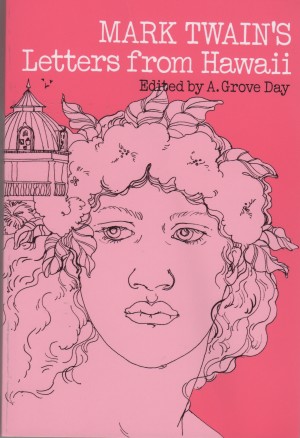
Letters from Hawaii by Mark Twain (1966. University of Hawai’i Press. ISBN 978-0-8248-0288-2)
I bought this book on my way home from Hawai’i. I spotted it in the airport bookstore on Oahu and I was intrigued, after reading Jack London’s collection of Hawai’i related tales, to read what Mr. Twain had to say about Hawai’i of the early 20th century. I wasn’t disappointed.
Oh, there are a few boring letters from Twain back home, to California, where Twain was living in at the time of his voyage to Hawai’i in 1866. The chapter on sugar cane production might be interesting to modern-day sugar cane farmers, agricultural historians, but likely no one else. But there are enough rollicking, riveting displays of Twain’s sense of humor and his ability to prettify travel narrative for most casual readers. A collection of articles Twain wrote for the Sacremento Union, the paper that underwrote the trip, the topics in this book range from descriptions of beautiful Hawaiian maidens swimming the surf in the altogether to Twain’s wry observations regarding Hawaiian legislative politics. Here’s a classic passage:
The mental caliber of the Legislative Assembly is up to the average of such bodies the world over-and I wish it were complimentary to say it, but it is hardly so. I have seen a number of legislatures, and there was a comfortable majority in each of them that knew just about enough to come in when it rained, and that was all. Few men of first-class ability can afford to let their affairs go to ruin while they fool away their time in legislatures for months on a stretch.
Twain invented a traveling companion (likely his own alter ego), the inflated and bumbling Mr. Brown, as a foil for some of the scenes depicted in the stories. In a passage discussing Brown’s seasickness, the author is reveals his descriptive and comedic talents:
He seemed as distressed and restless, at intervals-albeit the rule of his present case was to seem to look like an allegory of unconditional surrender-hopeless, helpless, and indifferent-he seemed as distressed and restless as if my conversation and my anecdotes were irksome to him. It was because of this that I as last dropped into poetry. I said I had been writing a poem-or rather, been paraphrasing a passage from Shakespeare-a passage full of wisdom, which I thought I might remember easier if I reduced it to rhyme-hoped it would be pleasant to him-said I had take a few liberties with the original…(After reciting the poem, Twain continued)…As I finished (reciting the poem), Brown’s stomach cast up its contents, and in a minute or two he felt entirely relieved and comfortable. He then said that the anecdotes and the eloquence were “no good” but if he got seasick again, he would like some more poetry.
The author’s best known work from his Hawaiian journey is Burning of the Clipper Ship Hornet at Sea, a tale which is contained in this volume. While the details of that tragic sinking (and Twain’s portrayal of the heroic efforts of the crew to reach the islands) are impressive, my favorite passages from his letters back to the mainland are those where he is immersed in the strange and almost fictional creation of the young Hawaiian nation. For while the Hawaiian culture had been around for centuries, the unified independent nation of Hawai’i was, at the time of Twain’s visit, a very recent development, the whole having emerged from a collection of separate fiefdoms on the sundry islands to form an interesting, if short-lived, kingdom modeled after Great Britain.
A fine way to learn what it was like to be a tourist on the major islands of the archipelago back at the dawn of steamships, the telegraph, and American expansionism.
4 stars out of 5.


